The Honourable Society of Lincoln's Inn is one of the four Inns of Court in London to which barristers of England and Wales belong and where they are called to the Bar. Lincoln's Inn is recognised as being one of the world's most prestigious professional bodies of judges and lawyers.
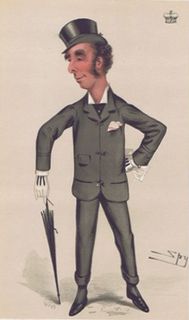
The Marquess of Queensberry Rules , also known as Queensbury Rules, are a code of generally accepted rules in the sport of boxing. Drafted in London in 1865 and published in 1867, they were named so as the 9th Marquess of Queensberry publicly endorsed the code, although they were written by a Welsh sportsman named John Graham Chambers. The code of rules on which modern boxing is based, the Queensberry rules were the first to mandate the use of gloves in boxing.

A town square is an open public space commonly found in the heart of a traditional town used for community gatherings. Related concepts are the civic center, the market square and the village green.
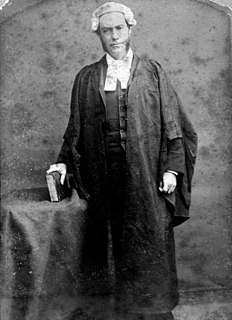
Court dress comprises the style of clothes and other attire prescribed for members of courts of law. Depending on the country and jurisdiction's traditions, members of the court may wear formal robes, gowns, collars, or wigs. Even within a certain country and court setting, there may be times when the full formal dress is not used, such as in trials involving children.
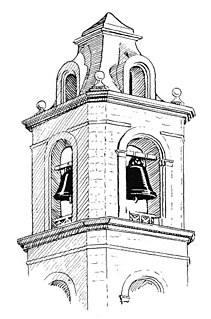
The belfry is a structure enclosing bells for ringing as part of a building, usually as part of a bell tower or steeple. It can also refer to the entire tower or building, particularly in continental Europe for such a tower attached to a city hall or other civic building.

A tribunal, generally, is any person or institution with authority to judge, adjudicate on, or determine claims or disputes—whether or not it is called a tribunal in its title. For example, an advocate who appears before a court with a single judge could describe that judge as "their tribunal." Many governmental bodies that are titled as "tribunals" are described so in order to emphasize that they are not courts of normal jurisdiction. For example, the International Criminal Tribunal for Rwanda was a body specially constituted under international law; in Great Britain, employment tribunals are bodies set up to hear specific employment disputes. In many cases, the word tribunal implies a judicial body with a lesser degree of formality than a court, in which the normal rules of evidence and procedure may not apply, and whose presiding officers are frequently neither judges, nor magistrates. Private judicial bodies are also often styled "tribunals." The word tribunal, however, is not conclusive of a body's function—for example, in Great Britain, the Employment Appeal Tribunal is a superior court of record.

The Queen's Bench ; or, during the reign of a male monarch, the King's Bench, is the superior court in a number of jurisdictions within some of the Commonwealth realms. The original King's Bench, founded in 1215 in England, was one of the ancient courts of the land and is now a division of the High Court of Justice of England and Wales. In the Commonwealth, the term Queen-on-the-Bench, or King-on-the-Bench is a title sometimes used to refer to the monarch in their ceremonial role within the justice system, as the fount of justice in that justice is carried out in their name.

The Crown Court of England and Wales is, together with the High Court of Justice and the Court of Appeal, one of the constituent parts of the Senior Courts of England and Wales. It is the highest court of first instance in criminal cases; however, for some purposes the Crown Court is hierarchically subordinate to the High Court and its Divisional Courts.

Bleachers, or stands, are raised, tiered rows of benches found at sports fields and other spectator events. Stairways provide access to the horizontal rows of seats, often with every other step gaining access to a row of benches.
A puisne judge or puisne justice is a dated term for an ordinary judge or a judge of lesser rank of a particular court.
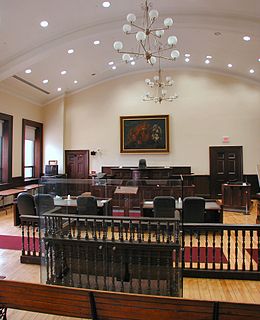
A courtroom is the enclosed space in which courts of law are held in front of a judge. A number of courtrooms, which may also be known as "courts", may be housed in a courthouse. In recent years, courtrooms have been equipped with audiovisual technology to permit everyone present to clearly hear testimony and see exhibits.
A schepen or échevin (French) or Schöffe (German) is a municipal officer in Belgium and formerly the Netherlands. It has been replaced by the wethouder in the Netherlands.

The Supreme Court of Korea is the highest court in South Korea. It is located in Seoul. Articles 101 through 110 of the Constitution of the Republic of Korea establish the Supreme Court and enumerate its powers and responsibilities. Although the Supreme Court is the highest court for most legal issues, the Constitutional Court of Korea is the court of last resort for more specialized constitutional issues such as impeaching presidents or dissolving political parties.

The Low German house or Fachhallenhaus is a type of timber-framed farmhouse found in Northern Germany and the easternmost Netherlands, which combines living quarters, byre and barn under one roof. It is built as a large hall with bays on the sides for livestock and storage and with the living accommodation at one end.

The court of assizes is the trial court which tries the most serious crimes in the judicial system of Belgium. It is the highest Belgian court with criminal jurisdiction, and as such, it is the only Belgian court that can sentence someone to life imprisonment. The courts of assizes are not permanent courts; a new court of assizes is assembled for each new trial. There is a court of assizes in each of the ten provinces of Belgium, and one in the arrondissement of Brussels-Capital. Further below, an overview is provided of the eleven courts of assizes and their seats. They are the only courts in Belgium for which the provinces are used as territorial subdivisions. They are also the only courts in Belgium that hold jury trials. The jury acts as sole trier of fact, but decides on the penalty together with the judges. The trial by jury of certain crimes is laid down in article 150 of the Belgian Constitution. The Belgian courts of assizes have the same origin as their French namesakes.
A Full Court is a court of law with a greater than normal number of judges. For a court which is usually presided over by one judge, a Full Court has three or more judges; for a court which, like many appellate courts, normally sits as a bench of three judges, a Full Court has a bench of five judges.
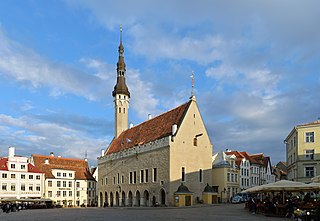
The Tallinn Town Hall is a building in the Tallinn Old Town, Estonia, next to the Town Hall Square. It is the oldest town hall in the whole of the Baltic region and Scandinavia.

Sir Charles Hall (1814–1883) was an English barrister and judge, who became Vice-Chancellor of England.

A porch is a room or gallery located in front of an entrance of a building. A porch is placed in front of the facade of a building it commands, and forms a low front. Alternatively, it may be a vestibule, or a projecting building that houses the entrance door of a building.














